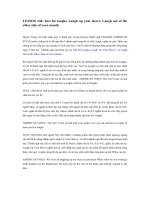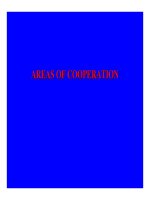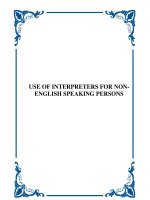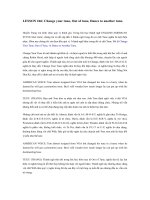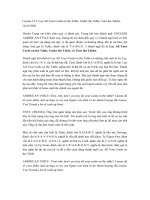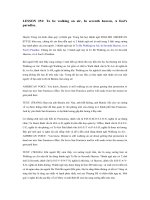Tài liệu GRAMMAR_ADVERBS OF FREQUENCY doc
Bạn đang xem bản rút gọn của tài liệu. Xem và tải ngay bản đầy đủ của tài liệu tại đây (78.99 KB, 24 trang )
ADVERBS OF FREQUENCY
There are two groups:
1. Definite Frequency Adverbs : every day, every week, every month,
every quarter, every year, annually, twice a day, three times a
week,…
- Positions: They usually go at the beginning or at the end of the
sentence.
2. Indefinite Frequency Adverbs : never,
seldom,rarely, hardly ever (= almost never),
occasionally, sometimes, often, usually, always.
- Positions: - They come after verb “BE”
- They go before all ordinary verbs
- They go after the first auxiliary
verb
3. Some indefinite frequency adverbs can go at
the beginning or at the end of the sentence:
Frequently, Generally, Occasionally = Once in a
while, Often, Sometimes, Usually.
4. Inversion of subject and verb after initial
negative adverbs: Never, Not only, So
Market conditions have never been as
favorable as they are now.
Never have market conditions been as
favorable as they are now.
The professionals not only demanded new training facilities, they
also proposed a revision of membership fees.
Not only did the professionals demand new training facilities,
they also proposed a revision of membership fees.
The winner was so exhausted that he collapsed soon after
finishing the race.
So exhausted was the winner that he collapsed soon after
finishing the race.
CONJUNCTIONS
There are three types of conjunctions:
1. Coordinating Conjunctions: For, And, Nor, But, Or, Yet, So.
(FANBOYS)
2. Subordinating Conjunctions:
- To introduce noun clauses: That, What, Where, When, How,
Why….
- To introduce adjective clauses: Who, Whom, Whose + noun,
Which, That, When, Where.
- To introduce adverb clauses:
• Adverb clauses of time: After, As soon as, As,
Before, When, While, Until, By the time, since
• Adverb clauses of place: Where, Wherever
• Adverb clauses of reason: Because, Since, As
• Adverb clauses of condition: If, Unless, Provided that
= Providing that = If , So/As long as = Only if
• Adverb clauses of concession: Although, Even
though, Though, Despite the fact that.
• Adverb clauses of direct opposition: While, Whereas
• Adverb clauses of cause and effect: So …… that, Such
……… that
• Adverb clauses of purpose: So that, In order that,
• Adverb clauses of manner, Distance, and Frequency:
As if, As though, As + adverb+ As
3. Correlative Conjunctions: Both ……… and,
Neither …… nor, Either ……… Or, Not only ……… but also
COMPOUND SENTENCES WITH COORDINATORS
Independent clause, FANBOYS Independent clause
for (reason)
and (addition)
nor (negative)
but (contrast)
or (choice)
yet (contrast)
so (result)
For Women live longer than men, for they take better care of
their health.
And Women follow more healthful diets, and they go to doctors
more often.
Nor Women don’t smoke as much as men do, nor do they drink
as much alcohol.
But Men may exercise harder, but they may not exercise as
regularly as women do.
Or Both men and women should limit the amount of fat in their
diets, or they risk getting heart disease.
Yet Women used to be known as the “weaker sex”, yet in some
ways, they are stronger than men.
So Men are less cautious than women, so more men die in
accidents.
COMPOUND SENTENCES WITH CONJUNCTIVE ADVERBS
INDEPENDENT CLAUSE; CONJUNCTIVE ADVERBS,
INDEPENDENT CLAUSE.
Coordinators Conjunctive adverbs Sentences
,and ; besides,
; moreover,
; further,
;furthermore,
; also,
; in addition,
Community college
offer preparation for
many occupations;
moreover, they
prepare students to
transfer to a four-year
college or university.
, but
, yet
; however,
; nevertheless,
Many community
colleges do not have
dormitories; however,
they provide housing
referral services.
, or ; otherwise, Students must take
final exams; otherwise,
they will receive a
grade of incomplete.
, so ; accordingly,
; consequently,
; hence,
; therefore,
; thus,
; as a result,
Native and nonnative
English speakers have
different needs;
therefore, most schools
provide separate
English classes for
each group.
COMPOUND SENTENCES WITH SEMICOLONS
A compound sentence can also be formed with a semicolon.
My older brother studies law; my younger brother studies medicine.
Poland was the first Eastern European country to turn away from
communism; others soon followed.
COMPLEX SENTENCES
INDEPENDENT CLAUSE DEPENDENT CLAUSE
DEPENDENT CLAUSES
NOUN CLAUSES
That there is a hole in the ozone layer of the earth’s atmosphere is well
known.
What he said was not true.
I don’t know whether (or not) I should take computer science ( or not).
What the thieves did with all the money remains a mystery.
REMEMBER: The verb in the introductory clause controls the tense of
the verb in the noun clause. If the introductory clause verb is in simple
present, present perfect, or future, the verb in the noun clause is in
whatever tense expresses the meaning that the introductory clause
intends.
However, when the verb in the introductory clause is in the past tense, the
verb in the dependent clause is usually in a past form.
The prime ministers agree that global warming is a serious problem.
They hope that all nations will be responsible for solving this serious
problem.
Further research will prove that carbon dioxide is largely responsible.
The prime ministers agreed that global warming was a serious problem.
They hoped that all nations would be responsible for solving this serious
problem.
ADJECTIVE CLAUSES
1.
Suject+Verb+Object+ WHO +Verb+Object
WHICH
THAT
WHOSE+NOUN
WHERE+Subject+Verb+Object
She is the girl who sits next to me in class.
The bat is the only mammal which(that) can fly.
Thomas Raven is a physicist whose book on time and space has been
translated into dozens of languages.
The new shopping mall is advertised as a place where you can find just
about anything you might want to buy.
2.
Subject+ WHO +Verb+Object+ Verb+Object
WHICH
THAT
WHOSE+NOUN
WHERE+Subject+Verb+Verb
People who don’t get enough sleep may become short-tempered and
irritable.
The cold weather which(that) swept in from the north damaged the fruit
crop.
The students whose names were called raised their hands.
The village where my father was born is still very poor.
ADJECTIVE CLAUSES REDUCED TO ADJECTIVE PHRASES.
Food that passes from the mouth to the stomach goes through a tube
which is called the esophagus.
Food passing from the mouth to the stomach goes through a tube called
the esophagus.
Animals that are born in a zoo generally adjust to captivity better than
those that are captured in the wild.
Animals born in a zoo generally adjust to captivity better than those
captured in the wild.
One of the most important foodstuffs in the world is flour, which is a fine
powder that is made by grinding wheat or other grains.
One of the most important foodstuffs in the world is flour, a fine powder
made by grinding wheat or other grains.
GENERAL FORM PARTICIPLES – ACTIVE VOICE
Verb Tense Sentences with Relative Clause Sentences with
Participial Phrase
Simple
Present
Many students who study at this
university are from foreign
country.
Many students
studying at this
university are from
foreign country.
Present
Continuous
Students who are taking
calculus must buy a graphing
calculator.
Students taking
calculus must buy a
graphing calculator.
Simple Past The team members, who looked
happy after their victory, were
cheered by the fans.
The team members,
looking happy after
their victory, were
cheered by the fans.
Past
Continuous
The crowd, which was cheering
wildly as the game ended,
wouldn’t leave the stadium.
The crowd, cheering
wildly as the game
ended, wouldn’t leave
the stadium.
Future Everyone who will take the Everyone taking the
TOEFL next month must pre-
register.
TOEFL next month
must pre-register
GENERAL FORM PARTICIPLES – PASSIVE VOICE
Verb Tense Sentences with Relative
Clause
Sentences with
Participial Phrase
Simple Present Lab reports that are not
handed in by Friday will not
be accepted.
Lab reports not handed
in by Friday will not be
accepted
Simple Past The prisoner, who was
surrounded by guards, walked
calmly to his execution.
The prisoner,
surrounded by guards,
walked calmly to his
execution.
CONTINUOUS FORM PARTICIPLES
Verb Tense Sentences with Relative
Clause
Sentences with
Participial Phrase
Present
Continuous
A law that is currently being
debated concerns abortion
rights.
A law currently being
debated concerns
abortion rights.
Past Continuous The signs that were being
posted around campus support
abortion rights.
The signs being posted
around campus support
abortion rights.
Future A movie that will be shown
tomorrow was made by an
anti-abortion group.
A movie being shown
tomorrow was made by
an anti-abortion group.
PERFECT FORM PARTICIPLES
Verb Tense Sentence with Relative Clause Sentence with
participial phrase
Present Perfect The secrets of the universe,
which have fascinated people
for centuries, are slowly being
revealed.
The secrets of the
universe, having
fascinated people for
centuries, are slowly
being revealed.
Past Perfect The film, which had been
shown too often in movie
theaters, did not attract a large
TV audience.
The film, having been
shown too often in
movie theaters, did not
attract a large TV
audience.
3.
Subject+Verb+Object+WHO +Subj+Verb.
WHOM
WHICH
THAT
Þ
WHOSE+NOUN
4.
Subject+ WHO + Subject +Verb+Verb+Obj.
WHOM
WHICH
THAT
Þ
WHOSE+NOUN
ADVERB CLAUSES ( Sequence of Tenses)
Present Simple Tense for Future Actions
Simple Futute (Will+Verb) + Time Words + Present Simple
As soon as
After
Before
Until
The moment
When
While + Present continuous
I’ll be there as soon as I find the key.
Next week when there is a full moon, the ocean tides will be higher.
When the tide comes in, the ship will leave the harbor.
I’ll wait right here until she comes.
I’ll talk to the boss the moment he comes in.
Present Perfect and Past Simple
Present Perfect + SINCE + Past Simple
We have been friends since we were at elementary school.
Future Perfect (Continuous)+by the time+ Present Simple
They got married in December 1999. By the end of this year, they will
have been married for ten years.
He promises her that he will come back and marry her in five years’ time,
but she’s afraid that by the time he comes back, she will have been
married and will have had …………children.
Past Simple and Past Continuous
° WHEN+ Past Simple, Past Continuous
° Past Continuous + WHEN + Past Simple
(Interrupted Action)
° WHILE + Past Continuous, Past Simple
° WHEN + Past Simple, Past Simple
(Two (or three) simultaneous actions)
When I got to the airport, Lisa was waiting for me in the baggage claim
area.
Yesterday David was crossing a street when a truck turned the corner
very fast and almost hit him.
Last Sunday while sandy was cleaning out the attic, she found her
grandmother’s wedding dress.
When Richard stopped his car suddenly, the groceries fell out of the bag
they were in and spilled all over the floor of the car.
Past Simple and Past Perfect
° WHEN + Past Simple, Past Perfect.
(By the time)
° BEFORE + Past Simple, Past Perfect.
° AFTER + Past Perfect, Past Simple.
° Past Perfect + UNTIL + Past Simple.
By the time Jason arrived to help, they had already finished moving
everything.
When she was born, the South of Vietnam had been totally liberated.
Last Sunday my parents allowed me to go out with my friends after I had
already done my homework.
Before he won the jackpot, he had lived a dog’s life.
He didn’t realize that he had lost his wallet until he got home.
TIME CLAUSES
When people had to hunt for food, they had continuous moderate
exercise.
People were eating a lot of protein while they were living on farms.
After people moved to urban areas, they had less protein in their diet.
Our eating habits changed as soon as food processing methods improved.
We haven’t met each other since we left university.
PLACE CLAUSES
Consumers usually prefer to do business wherever credit cards are
accepted.
I usually stop for lunch anywhere that is handy. (conveniently located)
Everywhere I shop, I use my credit cards.
MANNER, DISTANCE, and FREQUENCY CLAUSES
Kathleen spoke as if (as though) she were an authority on the subject.
(manner)
Pat jogs on the beach as far as she can.(distance)
She jogs on the beach as often as she can. (frequency)
The students completed the experiment as quickly as they could.
(manner)
REASON CLAUSES
Europeans are in some ways better environmentalists than North
American because they are more used to conserving energy.
Since many Europeans live, work, and shop in the same locale, they are
quite accustomed to riding bicycles, trains, and streetcars to get around.
As the price of gasoline has always been quite high in Europe, if a
European owns an automobile, it is likely to be a high-mileage model that
uses diesel fuel.
RESULT CLAUSES
So + adjective/ adverb + that
Such a/an + noun phrase + that
So much/many + noun phrase + that
So little/few + noun phrase + that
New textbooks are so expensive that many students buy used ones.
The cost of education is rising so rapidly that students are looking for
ways to cut costs.
The library is such a big place that I couldn’t find the book I needed.
There is always so much noise in the dormitory that I can’t study there.
There were so many students waiting in line to register for classes that I
decided to come back later.
PURPOSE CLAUSES
Farmers use chemical pesticides so that they can grow bigger harvests.
Farmers also spray their fields in order that consumers might enjoy
unblemished fruits and vegetables. (free of imperfections)
CONCESSION (UNEXPECTED RESULT) CLAUSES
Although/ Though/ Even though I studied all night, I failed the test.
I failed the test although/though/even though I studied all night.
CONTRAST (DIRECT OPPOSITION) CLAUSES
San Francisco is very cool during the summer, whereas San Juan is
extremely hot.
While San Juan is extremely hot during the summer, San Francisco is
very cool.
CAUSATIVE VERBS
GET & HAVE
Active:
GET somebody TO DO something
HAVE somebody DO something
Don got some kids in the neighborhood to clean out his garage.
I had the plumber repair the leak.
Passive:
GET something DONE
HAVE something DONE
Don got his garage cleaned out.
I had the leak repaired.
MAKE & LET
MAKE somebody DO something
(=force sb to do sth)
(= cause sth to happen)
LET somebody DO something
(= allow sb to do sth)
The doctor made the patient stay in bed.
Peeling onions always makes me cry.
When I was younger, my parents never let me go out in the
evenings.
ORDER & WANT
ORDER something DONE
WANT something/somebody DONE
Before the prime minister arrived, the police ordered the area
cleared.
Mr. Watson wants the report rewritten soon.
Our company always wants its customers satisfied.
CONDITIONAL SENTENCES
Type Verb Tense in
“If Clause”
Verb Tense in
“Result Clause”
Examples
1 Simple present Will + Verb
(Can/May)
If you come
before the
meeting, we’ll
have time to
talk.
2 Simple Past
“BE” » WERE
Would + Verb
(Could/Might)
If my windows
were larger, I
would get more
light.
3 Past perfect Would Have
+Past Participle
(Could/Might)
If I had known
you were sick, I
would have
come to visit
you.
Some Important Notes
°Mixed Time in Conditional Sentences (Type 2 & 3)
TRUE: I did not eat anything several hours ago, so I am hungry now.
CONDITIONAL: If I had eaten something several hours ago, I wouldn’t
be hungry now.
TRUE: He is not a good student. He did not study for the test yesterday.
CONDITIONAL: If he were a good student, he would have studied for
the test yesterday.
°Inversion of subject and verb in “If Clause”
Type 1: If the weather should get worse, we’ll have to camp somewhere
else.
Should the weather get worse, we’ll have to ……
Type 2: If I were in your shoes, I wouldn’t do that.
Were I in your shoes, I wouldn’t do that.
Type 3: I would have visited you sooner if someone had told me you were
in the hospital.
I would have visited you sooner had someone told me you were
in the hospital.
Mixed Time: If we had invested in the telecommunications industry, we
would be rich by now.
Had we invested in the telecommunications industry, we
would be rich by now.
THE DEFINITE ARTICLE “THE”
USE “THE”
1. When the object or group of objects is unique.
The sun, the earth, the sky, the moon….
The earth revolves around the sun.
2. Before a noun which has become definite as a result of being
mentioned a second time.
I met a man and a woman. The man is short, and the woman is tall.
3. Before a noun made definite by the addition of a phrase or a clause
The girl in a blue dress,
The man with beard and moustache
The man whose wallet was stolen is reporting to the police now.
4. Before superlatives and First, Second, Third….
5. The+ adjective represents a class of persons
The rich, the poor, the sick…
OMIT “THE”
1. Before abstract nouns (happiness, courage), material nouns (gold,
wood), sports (football, tennis), subjects (math, physics), meals
(breakfast, dinner), foods and drinks (chicken, coffee).
2. Before: HOME, CHURCH, HOSPITAL, SCHOOL, PRISON,
WORK, SEA, TOWN, BED.
3. However, when those places are visited or used for other reasons,
“THE” is used.
He goes to the prison sometimes to give lectures.
I’m going to the hospital to visit a friend who is ill.
He went to the church to repair the electrical wiring.
She always goes to the school on time to collect her son.
GERUNDS AND INFINITIVES
1. Verbs followed by Gerunds: admit, avoid, consider, enjoy, finish,
can’t help, keep, mind, quit, recommend, risk, suggest…
2. Verbs followed by Infinitives: can(can’t) afford, agree, appear,
arrange, ask, beg, care, decide, demand, deserve, expect, fail,
hesitate, hope, learn, manage, need, offer, plan, prepare, pretend,
promise, refuse, seem, swear, volunteer, wait, want, wish….
3. Verbs followed by a (pro)noun + an infinitive: advise, allow, ask,
beg, cause, convince, encourage, expect, forbid, force, hire, invite,
need, order, permit, persuade, remind, require, teach, tell, urge,
want, warn …
4. Verbs followed by either gerunds or infinitives:
A. Verbs followed by either gerunds or infinitives with no
difference in meaning: begin, start, continue, like, love,
prefer, hate, can’t stand, can’t bear…
B. Verbs followed by either gerunds or infinitives with a
difference in meaning: remember, forget, regret, try, stop.
ADVERB CLAUSES REDUCED TO PARTICIPIAL PHRASES
Retain
Before
Since
(time)
Before a student chooses a college,
he or she should consider several
factors.
Before choosing a college, a
student should…
Carlos hasn’t been back home since
he came to the United States 3
years ago.
Since coming to the United States
3 years ago, Carlos…
Carlos hasn’t been back home
since coming to the United States 3
years ago.
Delete
Because
Since
As
(reason)
As
(time)
Because (Since/As) Carlos came
from a very conservative family, he
was shocked at the American
system of coed dormitories.
Coming from a very
conservative family, Carlos was
shocked at the American system of
coed dormitories.
As he gradually got used to
American customs, he became less
homesick.
Gradually getting used to
American customs, he became less
homesick.
Retain or Delete
After
While
When
After he had passed the TOEFL
exam, he became a freshman at his
college.
After passing the TOEFL exam,
he became a freshman at his
college.
He became a freshman at his
college after passing the TOEFL
exam.
Having passed the TOEFL
exam, he became a freshman at his
college.
While he was preparing for the
TOEFL, he lived with an American
family.
While preparing for the TOEFL,
he lived with an American family.
Preparing for the TOEFL, he
lived with an American family.
He lived with an American
family while preparing for the
TOEFL.
When he was asked about his life in
the United States, he said that he
was enjoying himself, but that he
was a little homesick.
When asked about his life in
the United States, he said that he
was enjoying himself, but that he
was a little homesick.
Asked about his life in the
United States, he said that he was
enjoying himself, but that he was a
little homesick.
REMEMBER:
1. Retain “before” and “since” when it is a time subordinator.
2. Delete all three reason subordinators “because’, since”, and
“as”. Delete “as” when it is a time subordinator.
3. Retain “after”, “while”, and “when” if the participial phrase
follows the independent clause. When the phrase is in another
position, you may either retain or delete these subordinators.
4. Make sure that the subject of the adverbial clause and the
subject of the independent clause are the same before reducing
the adverbial clause to a participial phrase.
VERBAL ADJECTIVES
1. The present participle (Verb+ING) can be an adjective which
describes the use or purpose of a person or thing.
Examples: a walking cane, a dining room, a sitting room, riding
boots, a shopping mall, a filing cabinet, drinking water, sleeping
pills, a sleeping bag,…
2. The present participle (Verb+ING) can be an adjective
which describes the person or thing that is creating a
feeling or reaction.
Examples: a satisfying job, a boring lesson/person, an
interesting idea, shocking news, a tiring trip, a terrifying
experience,…
3. The present participle (Verb+ING) can also describe the
activity that the person or thing is involved in.
Examples: a drinking buffalo, the singing girl, the sleeping
boy, the visiting team,…
4. The past participle (Verb+ED) can be an adjective which
describes the person or thing that is receiving the feeling
or reaction.
Examples: a broken chair, a satisfied customer, the
tired workers, the underlined words, developed countries,
5. REMEMBER:
Subject (People) + Be + Verb+ ED
We are very interested in learning English.
Subject (Things) + Be + Verb+ING
Is this grammar note boring?
PARALLELISM
Use parallel structures with coordinating conjunctions (and, but, or,
yet) and correlative conjunctions ( not only…but also, either …or,
neither…nor, both …and)
Ex: Love and being married go together. (Faulty Parallelism)
Loving and being married go together. (Correct)
Being in love and being married go together. (Correct)
Differing expectations for marriage not only can lead to
disappointment but also to anger. (Faulty Parallelism)
Differing expectations for marriage can lead not only to
disappointment but also to anger.
Having a solid marriage can be more satisfying than the acquisition of
wealth. (Faulty Parallelism)
Having a solid marriage can be more satisfying than acquiring wealth.
A solid marriage can be more satisfying than wealth.
Fran spends her time reading, listening to music, and she works in the
kitchen. (Faulty Parallelism)
Fran spends her time reading, listening to music, and working in the
garden.(A balanced series of _ING words)
After the camping trip, I was exhausted, irritable, and wanted to eat.
(Faulty Parallelism)
After the camping trip, I was exhausted, irritable, and hungry.( A
balanced series of descriptive adjectives)
My hope for retirement is to be healthy, to live in a comfortable house,
and having plenty of money. (Faulty Parallelism)
My hope for retirement is to be healthy, to live in a comfortable house,
and to have plenty of money. (A balanced series of to-infinitives)
Nightly, Fred puts out trash, checks the locks on the doors, and the
alarm is turned on. (Faulty Parallelism)
Nightly, Fred puts out trash, checks the locks on the doors, and turns
on the alarm.( Balanced words and word order)
Complete the following sentences
1. Three things I like about him are his sense of humor, his
thoughtfulness, and …………………………………
2. The movie was terrible: the scene was fake, the plot was
ridiculous, and ……………………………………………………………….
3. My New Year’s resolutions were to lose weight, to stop smoking,
and to …………………………………
4. The people in the long checkout line flipped through magazines,
stared at the cashier, or …………………………………….
5. During my first day as a waiter, I learned how to fold napkins, how
to use the coffee machine, and ……………………………………………
6. My best friend is honest, dependable, and ……………………
Use the correct form of the words in parenthesis.
Architects responsible for the (construct) ………………. of many skyscrapers
believe that a tall building must always have a certain minimum (wide)
……… but that there is no limit to its absolute (high)………. This means that
the skyscrapers of the future are likely to be even taller.
Engineers agree with this, but there is (disagree) ……………over the best
shape for the tall, slim buildings. The effects of wind (press) …………mean
that the cylindrical designs have enjoyed some (popular) …………….in recent
years, and these are quite pleasing to the eye. (fortunate) …………….,
however, the ideal shape is an ugly square with heavily rounded corners.
Would these tall buildings of the future offer more than a (wonder)
………… view? Some believe tall towers could contain all the (require)
…………….for modern living. The (inhabit) ……………of these vertical villages
would travel up and down between their home and work zones and would
(rare) ……………need to journey to ground level.
Identify and correct errors and correct forms of comparatives and
superlatives.
1. The period is probably the most easiest punctuation mark to
use.
2. When metal replaced wood in the construction of ships’
hulls, more strong and large ships could be built.
3. Charcoal is the most commonly used cooking fuel in the
world.
4. Soft solder melts at a low temperature than ordinary solder.
5. Many of the nation’s most important documents are stored
in the National Archives Building in Washington, D.C.
6. The surfboards used 25 years ago were more heavier than
the ones used by surfers today.
7. Few American politicians have spoken more eloquently
than William Jennings Bryan.
8. Subterranean termites are the more destructive type of
termites in the United States.
9. Prince Edward Island is the less populous of Canada’s ten
provinces.
10. During a depression, economic conditions are far worse
than they are during a recession.
11. One of the most basic American contributions to technology
was the so-called “American system” of interchangeable
machine parts.
12. The horse chestnut has a stronger, bitter taste than other
chestnut.
13. Chicago’s Field Museum is one of the largest and better
known natural history museums in the United States.
14. Baltimore has one of the world’s most finest natural
harbors.
15. The Kennedy-Nixon race of 1960 was the closest
presidential election of this century.
16. The finback whale is the fastest of all whales, and only the
blue whale is largest.
17. The cello is shorter and more slender than the double bass.
